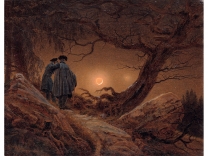Summary, analysis and interpretation
The ballad „Sehnsucht“ by Joseph von Eichendorff was published in 1834 and belongs to the period of Romanticism. The ballad consists of 3 stanzas, each stanza is composed of 8 lines. Its rhyme scheme is ABAB CDCD – a so-called alternate rhyme/crossed rhyme. The structure is quite simple and regular as each line and each stanza are equal in length. The whole poem is written from the perspective of a first-person narrator. However, the mode changes within the poem. While great part of it is written in indicative, the second last line of the first stanza is written in conjunctive. Direct speech – which is not marked by inverted commas – is written in present tense, whereas the other parts are in past tense.
The person speaking stands lonely next to the window and watches his surroundings. In spite of the calm and moony atmosphere the narrator longs for faraway places – as the title also suggests.
In the first stanza the narrator describes what he can hear and see, accompanied by melancholy and desire. The enjambment1 in line 3 underlines this impression. The narrator is located indoors while the events he is talking about take place outside. This physical separation stresses the loneliness of the narrator, too.
The meaning of the word “Ferne” is emphasised by the adjective “weite”. This desire for the far distance is a typical motif for Romanticism. The acoustic signal of the posthorn expresses the narrator’s desire for travelling. This desire evokes a pain in his heart, which is shown by the metaphor2 “Herz mir im Leib entbrennte” (line 5). His desire feels like fire burning within him, causing emotional pain. However, the person speaking does not articulate his desire – “heimlich gedacht” (line 6) - as it might be too utopian.
The following exclamation “Ach” (line 7f.) puts emphasis on his desires to travel around and his emotional suffering. The words “Sterne” (line 1) and “Sommernacht” (line 8) are taken from the world field of night and represent a typical motif of this period.
In the second stanza the person speaking observes two fellows, whom he apparently would like to accompany (cf. line 8). These two travellers symbolise the freedom and independence of travelling and again evoke the narrator’s desire for departing. Their singing combines two other motifs of this period: singing and nature. Especially nature is idealised: “rauschen so sacht” (line 14). These songs (“stürzen in die Waldesnacht” line 16) evoke the narrator’s interest for adventures and for wilderness. It has to be noticed that wilderness is always personalised and hence appears to be independent and human. As before, the last line of the second stanza makes use of words taken from the areas of night and nature.
In the third stanza the singing continues. In contrast to the preceding stanza, however, now it is sung about things created by men: “Marmorbilder”, “Gärten”, “Lauben”, “Paläste” (line 17ff.). These entities are described in a quite picturesque and unrealistic way. The narrator seems to glorify them, maybe knowing that they do not exist but still longing for them. Here, another motif of this literary period appears: escape from reality. The narrator creates a world where young girls are sitting next to the window, listening to the outside world (cf. line 21). This line can be seen as a link to the first stanza, where the narrator is waiting, dreaming and looking out of the window. A number of personifications3 are used for describing this scenery: “der Lauten Klang erwacht” (line 22), “Brunnen verschlafen rauschen” (line 23).
The last line of the final stanza is identical to the one of the first stanza creating both a content-related as well as a formal connection. Nevertheless, the punctuation differs. While in the first stanza an exclamation mark is used, emphasising that the narrator makes an exclamation expressing his desire, in the final stanza a final stop and a dash is used. This suggests a rather calm and thoughtful ending.
Eichendorff’s poem contains a number of motifs that are typical for the period of Romanticism, which was shaped by emotions and the flight from the shattering reality of the French revolution and the beginning industrialisation. From this period on, the poets did not see themselves as advisors for society but rather as outsiders. In “Sehnsucht” this can be seen, for example, in the appearance of the person speaking, who stands lonely next to the window watching the outside world. He is longing for the idyllic nature, which did apparently not exist anymore. Moreover, human senses appear many times throughout the poem. Not only are the visual senses referred to (“es schienen so golden die Sterne” line 1) but also the acoustic (“und hörte aus weiter Ferne“ line 3) as well as the sense of touch (“das Herz mir im Leibe entbrennte” line 5) are mentioned.
To sum up, it can be said that the subject of Eichendorff’s ballad is the desire for nature and travelling that can never be fulfilled but lingers inside the narrator.

